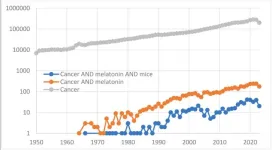(Press-News.org) Researchers examining the data on opioids for pain caused by cancer have found surprisingly large gaps in evidence regarding the true benefits of these medicines for cancer pain. The review challenges the commonly held view that opioids are the most powerful pain relievers.
The University of Sydney-led review highlights there is no ‘one size fits all’ treatment approach for cancer pain, urging health professionals and patients to carefully weigh up the evidence when deciding on a suitable pain management plan.
Opioid pain relievers are the most common treatment for cancer pain management. Many international guidelines including the World Health Organization, recommend opioid medications to manage background cancer pain (constant pain) and breakthrough cancer pain (temporary flare-ups of pain in addition to background pain).
However, the study found very few trials have compared commonly used opioid medicines such as morphine, oxycodone and methadone with placebo.
The study did not find convincing evidence that morphine was better or safer than other opioid medicines for background cancer pain outside of end-of-life care.
This is despite morphine being widely viewed as the ‘gold standard treatment’ for cancer care by physicians and recommended in many international clinical guidelines for moderate to severe cancer pain because of its low cost and accessibility.
The review also found non-steroidal anti-inflammatory drugs (NSAIDs) including aspirin and diclofenac may be at least as effective as some opioids for background cancer pain.
“The lack of evidence comparing opioid medicines to placebo for cancer pain probably reflects the ethical and logistical challenges associated with carrying out such trials. Yet these trials are necessary to guide clinical decision making,” says lead researcher Dr Christina Abdel Shaheed from the University of Sydney School of Public Health, Faculty of Medicine and Health and Sydney Musculoskeletal Health which is an initiative of the University of Sydney, Sydney Local Health District and Northern Sydney Local Health District.
“In practise, opioids are indispensable for intractable pain and distress at the end of life. What is worth highlighting is that non-opioids, particularly NSAIDs, are surprisingly effective for some cancer pain, and may avoid the problems of dependence and waning opioid analgesia over time,” says co-author Professor Jane Ballantyne, from the University of Washington School of Medicine, USA.
“People with background cancer pain may have an overall better life experience if there is less focus on using opioids to reduce their pain level,” says co-author Professor Martin Underwood from the University of Warwick, UK.
“The hope is that the findings can help guide doctors and patients to choose between different opioid treatment for cancer pain and empower individuals to consider alternatives if they are unable to tolerate opioid medicines or choose not to take them,” said senior author Dr Mark Sidhom, from the Cancer Therapy Centre, Liverpool Hospital, Australia.
The results are published in CA: A Cancer Journal for Clinicians today.
Key findings:
The study examined data from more than 150 published clinical trials.
There were very few trials comparing opioid medicines to placebo.
Of the placebo-controlled trials, there is moderate certainty evidence tapentadol works better than placebo for background pain caused by cancer.
Opioids commonly thought of as weaker (eg codeine), or NSAIDs such as aspirin, piroxicam, ketorolac, diclofenac and the antidepressant medicine imipramine may be just as good as ‘powerful’ opioids for background cancer pain, with fewer side effects.
For breakthrough cancer pain, fentanyl used as a nasal spray, under the tongue, between the gum and cheek, or as an oral spray, may be more effective than placebo (although not for regular use). Fentanyl was also associated with more side effects than placebo.
It is possible that morphine and other opioids may affect how well the body is able to fight cancer. Research is needed to determine whether there are negative interactions between opioid medicines and anti-cancer treatments or the immune system, to ensure that pain management does not negatively impact the ability to effectively treat the cancer.
More research is needed, particularly on non-drug interventions for cancer pain management.
-ENDS-
END
Embargoed for release until 5:00 p.m. ET on Monday 18 December 2023
Annals of Internal Medicine Tip Sheet
@Annalsofim
Below please find summaries of new articles that will be published in the next issue of Annals of Internal Medicine. The summaries are not intended to substitute for the full articles as a source of information. This information is under strict embargo and by taking it into possession, media representatives are committing to the terms of the embargo not only on their own behalf, but also on behalf of the organization they represent.
----------------------------
1. ...
B cell deficiency is a common condition that can result either from immunosuppressant drugs used to treat autoimmune disease or certain cancers — such as rituximab (RTX) — or from natural immune deficiency. These patients suffer from a weakened immune system that is less effective at combating both viral and bacterial diseases. As B cells are a key type of immune cell that produces antibodies, a deficiency results in a significant decrease in antibody count that can lead to severe disease or death upon infection with SARS-CoV-2.
Researchers at the Ragon Institute of Mass General, MIT, and ...
ARLINGTON HEIGHTS, Ill. – (December 18, 2023) — Two new practice parameters from the Joint Task Force for Practice Parameters (JTFPP) offer evidence-based recommendations for the diagnosis and management of anaphylaxis and atopic dermatitis (AD) in pediatric and adult patients. The Joint Task Force is a partnership between the American College of Allergy, Asthma and Immunology (ACAAI) and the American Academy of Allergy, Asthma and Immunology.
“Both anaphylaxis and atopic dermatitis are allergic conditions that affect millions of people – in the United States and around the world,” says allergist Jay Lieberman, MD, co-chair of the JTFPP ...
New research suggests that air pollution may contribute to the development or worsening of skin conditions.
The work, which is published in Dermatology and Therapy and led by scientists at Massachusetts General Hospital (MGH), a founding member of the Mass General Brigham healthcare system, points to the need to improve air quality to lower the burden of skin disease, especially for vulnerable communities.
“We were inspired to investigate the relationship between air pollution and skin inflammation after listening to patients who kept telling us that their skin conditions like eczema were particularly bad, and in some cases ‘worse than ever before,’ this summer,” ...
“[...] murine models proved to be valuable and, in some cases, indispensable for advancing melatonin applications in oncology [...].”
BUFFALO, NY- December 18, 2023 – A new research perspective was published in Oncotarget's Volume 14 on December 12, 2023, entitled, “Melatonin and carcinogenesis in mice: the 50th anniversary of relationships.”
Fifty years ago, in 1973, Vladimir N. Anisimov and coauthors demonstrated for the first time an inhibitory effect of the pineal ...
New Haven, Conn. — In a new study by researchers at the Yale School of Public Health, two “forever chemicals” spurred cancer cells in the lab to migrate to new positions, an indication that the chemicals could contribute to cancer metastasis in living organisms.
The study addressed the group of industrial chemicals called per- and polyfluoroalkyl substances (PFAS). The substances are known as “forever chemicals” because they don’t break down in the environment and can build up in the human body. They have the ability to shed water and resist penetration by oils. They are ...
Survey Highlights:
A majority of Americans (51%) say it takes them weeks to feel less stressed after the holidays, with more than a quarter of moms reporting it takes them a month or more to recover.
71% of respondents say that their biggest regret after the holidays is that they did not take the time to relax and enjoy the season.
Overall, respondents (63%) claimed that the holiday season is more stressful than tax season.
Eating healthy (69%), exercising regularly (64%), and getting enough sleep (56%) are the top three things that respondents have trouble prioritizing during the holiday season.
79% of people surveyed agree that, during the holidays, they are so focused on creating special ...
Public opinion polls are often considered "the will of the people" but a new study on the role of polls in South Korea shows that they may not always be that transparent.
"Using polls to gauge what people think about politics is not as simple as it sounds, as there are multiple mediating factors between what people think and how their views may be represented in the media," says co-author Sunmin Kim, an assistant professor of sociology at Dartmouth. "Our research shows more broadly, how in a democracy, measuring what people think or want can be a highly haphazard and unpredictable process based on the ways public opinion poll ...
A team of Brigham researchers analyzed GPT-4’s performance in four clinical decision support scenarios: generating clinical vignettes, diagnostic reasoning, clinical plan generation and subjective patient assessments.
When prompted to generate clinical vignettes for medical education, GPT-4 failed to model the demographic diversity of medical conditions, exaggerating known demographic prevalence differences in 89% of diseases.
When evaluating patient perception, GPT-4 produced significantly different responses by gender or race/ethnicity for 23% of cases.
Large language models (LLMs) like ChatGPT and GPT-4 have the potential to assist in ...
Apes recognize photos of groupmates they haven’t seen for more than 25 years and respond even more enthusiastically to pictures of their friends, a new study finds.
The work, which demonstrates the longest-lasting social memory ever documented outside of humans, and underscores how human culture evolved from the common ancestors we share with apes, our closest relatives, was published today in the journal Proceedings of the National Academy of Sciences.
“Chimpanzees and bonobos recognize individuals even though they haven’t seen them for ...

